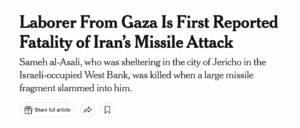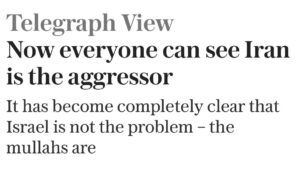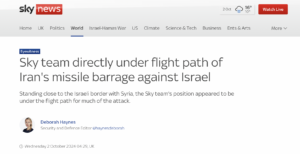On Tuesday evening, the Islamic Republic of Iran launched a large-scale ballistic missile attack on Israel, firing nearly 200 rockets across the country. Air raid sirens sounded throughout Israel, sending civilians scrambling for safety as the barrage unfolded.
Iran framed the attack as retaliation for Israel’s recent operations that eliminated senior Hezbollah members, including the group’s leader Hassan Nasrallah, during a strike in Beirut on September 27. While the media’s coverage of Nasrallah’s death—especially the disturbingly sympathetic language used to describe a terrorist leader—was flawed, the reporting on Iran’s direct assault on Israel struck a notably different tone.
The majority of media outlets adhered to the facts in their reporting of the incident, recognizing the unprecedented attack for what it was: a significant escalation initiated by Iran. Nevertheless, there were still notable and disappointing exceptions, which we will address later.
For example, both the Associated Press and Reuters published reports with headlines that accurately reflected the situation: Iran had attacked Israel in a move that risked igniting a wider regional conflict. Reuters included a photo gallery documenting the attack’s impact on Israeli civilians, featuring images of people seeking shelter by the roadside and the aftermath of a rocket strike on a school building in Gedera.
Meanwhile, The New York Times dedicated some of its coverage to the only confirmed casualty—a laborer from Gaza—highlighting his death and quoting his father’s remark that the attack “didn’t serve Palestinian interests.”


Hours after the attack, The Telegraph published an editorial that unequivocally identified Iran as the “aggressor” in the Middle East—a fact that should be obvious, yet is frequently overlooked in much of the global media’s coverage of the region.

Sky News and CNN both dedicated pieces to the dramatic moments their live broadcasts were cut short and their journalists ran for cover as missiles rained down, offering a glimpse into the harsh reality faced by Israeli civilians during such attacks.
Matt Gutman reported for ABC News from inside a shelter in Tel Aviv and described how civilians had been forced to rush for cover after receiving alerts of an impending attack.

Missile or missile fragment impacts in downtown Tel Aviv pic.twitter.com/q7OPhvRiZl
— Jim Sciutto (@jimsciutto) October 1, 2024
However, as previously mentioned, there were several disappointing exceptions in the coverage. One such example is the two separate BBC interviews featuring so-called “expert” guests. In one, British academic Andreas Krieg was given an uninterrupted platform to warn that the international community “must ensure Israel does not disrupt the regional order as we know it,” as it defends itself from attack.
Meanwhile in the BBC studio… pic.twitter.com/NyB10oAqet
— Jake Wallis Simons (@JakeWSimons) October 1, 2024
Even more troubling was the BBC’s decision to interview Iranian academic Sayed Mohammad Marandi about the attack, just hours after the broadcaster acknowledged it had failed to adequately challenge Marandi during a prior interview with Mishal Husain on BBC Radio 4 in which he repeatedly accused Israel of committing genocide.
Cited in @telegraph: “The Iranian-American academic, who is the son of the former Iranian health minister, has previously been called a “propagandist” and “mouthpiece” for the Iranian regime by HonestReporting, an organisation that works to combat prejudices in the media.” https://t.co/UO4qqbQflB
— HonestReporting (@HonestReporting) October 2, 2024
Having already been forced to apologize for letting Islamic Republic mouthpiece Seyed Mohammad Marandi spew his extremism and antisemitism on @BBCr4today, it takes a special kind of idiocy to allow him to do the same on your TV broadcasts as well.
But that’s @BBCNews for you. https://t.co/l8pcaBaf1O
— HonestReporting (@HonestReporting) October 2, 2024
And in one of the more unprofessional moments of coverage, CNN’s Ben Wedeman described people in Beirut as taking “solace” in the attack, which he contrasted with the so-called “modest” Iranian missile and drone assault on Israel in April.
How is @bencnn still allowed to report? So far, he has explained that people in Beirut are finding “solace” in watching the attack on Tel Aviv, and described the Iranian attack in April – where 300 ballistic and cruise missiles and drones were launched at Israel – as “modest.”
— HonestReporting (@HonestReporting) October 1, 2024
A final point remains to be made.
While the international media’s coverage in this instance was encouraging, it should not be the exception—it must become the standard.
Liked this article? Follow HonestReporting on Twitter, Facebook, Instagram and TikTok to see even more posts and videos debunking news bias and smears, as well as other content explaining what’s really going on in Israel and the region. Get updates direct to your phone. Join our WhatsApp and Telegram channels!
Credits:- Noam Revkin Fenton via Flash90 – Wisam Hashlamoun via Flash90 – Zain Jaafar/AFP via Getty Images – Kyodo via Reuters Connect


